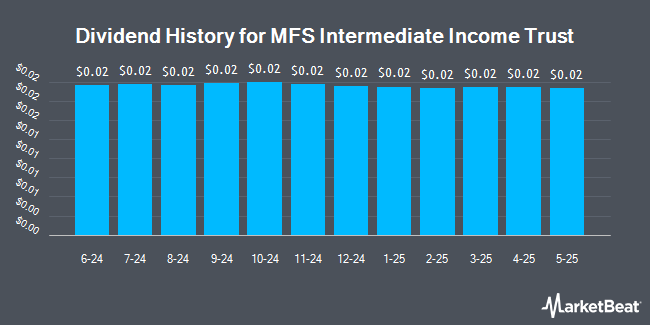MFS Intermediate Income Trust (NYSE:MIN - Get Free Report) declared a monthly dividend on Thursday, July 3rd, Wall Street Journal reports. Investors of record on Tuesday, July 15th will be given a dividend of 0.0195 per share by the financial services provider on Thursday, July 31st. This represents a $0.23 annualized dividend and a yield of 8.69%. The ex-dividend date is Tuesday, July 15th.
MFS Intermediate Income Trust Stock Performance
MIN stock traded down $0.01 during midday trading on Friday, hitting $2.69. The company had a trading volume of 64,764 shares, compared to its average volume of 191,772. MFS Intermediate Income Trust has a 52 week low of $2.61 and a 52 week high of $2.79. The stock's 50 day moving average price is $2.68 and its 200 day moving average price is $2.68.
MFS Intermediate Income Trust Company Profile
(
Get Free Report)
MFS Intermediate Income Trust is a closed ended fixed income mutual fund launched and managed by Massachusetts Financial Services Company. The fund invests in fixed income markets across the globe. It primarily invests in debt instruments. The fund seeks to benchmarks the performance of its portfolio against the Barclays Intermediate U.S.
Recommended Stories

Before you consider MFS Intermediate Income Trust, you'll want to hear this.
MarketBeat keeps track of Wall Street's top-rated and best performing research analysts and the stocks they recommend to their clients on a daily basis. MarketBeat has identified the five stocks that top analysts are quietly whispering to their clients to buy now before the broader market catches on... and MFS Intermediate Income Trust wasn't on the list.
While MFS Intermediate Income Trust currently has a Hold rating among analysts, top-rated analysts believe these five stocks are better buys.
View The Five Stocks Here
Unlock the timeless value of gold with our exclusive 2025 Gold Forecasting Report. Explore why gold remains the ultimate investment for safeguarding wealth against inflation, economic shifts, and global uncertainties. Whether you're planning for future generations or seeking a reliable asset in turbulent times, this report is your essential guide to making informed decisions.
Get This Free Report
Like this article? Share it with a colleague.
Link copied to clipboard.